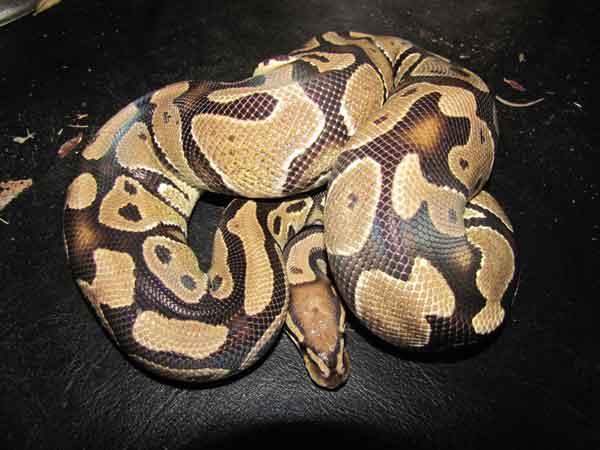WHEN AUBURN FIREFIGHTERS arrived at a fire in the attic of an apartment house in July, they were astonished by what they saw: more than 30 large ball python snakes, some of which were crawling around on the floor. Yikes!
Well, true to their profession, the firefighters saved the lives of some of the snakes, but most died. The fire started in a heating unit keeping the snakes warm. These snakes live in hot climates and, according to experts, can’t survive outside in Maine’s cold climate.
And that is why, much to my astonishment, Mainers can have all the ball pythons they want, without a permit. In theory, these snakes can’t survive if let loose here. In fact, 16 types of pythons require no permit in Maine, along with eight types of boas and three kinds of rat snakes. I am not the least bit comforted to know that permits are required for the black rat snake and the Old World rat snake.
The management of exotic animals in Maine is an impenetrable jungle of laws and rules, with responsibility shared by the Departments of Agriculture, Conservation and Forestry, and Inland Fisheries and Wildlife. Most of the job rests with DIF&W, which receives no public funding for it, so sportsmen pay the bills.
I’ve been following this sad saga for several years and attended a meeting last week of a new task force charged with sorting out these problems and making recommendations to the Legislature in January.
The list of problems is longer than a ball python. Exotic animals can be purchased online easily from out-of-state vendors and brought to Maine.
Many people don’t know that a lot of these animals require permits. The permits are cheap and don’t begin to cover DIF&W’s administrative and enforcement costs. The requirements of DIF&W are extensive, including inspections of the animal’s facility both before the permit is issued and annually ever after. Some of DIF&W’s top people spend a huge amount of time on all of this.
Enforcement problems are widespread. Game wardens can’t tell the difference between a regular king snake that doesn’t require a permit and a scarlet king snake that does require a permit. Who could? Cage requirements alone take up 15 pages in the law book.
And wardens often are put in hair-raising situations. Really, would you want to be called on to check out an African knife fish?
The question of what to do with confiscated animals is another big problem. At a meeting at DIF&W last September, a guy took a small scorpion out of container, too close to me for comfort. The scorpion had been confiscated and was on its way to Avian Haven, a Maine animal rehabilitation facility. If that scorpion had taken a step toward me, they wouldn’t have had to transport it anywhere!
Some of these stories are incredible. A single mother with two children paid $3,000 for an animal she thought would be a great pet for her kids. Game wardens researched the cat and discovered it to be dangerous. They refused the permit and helped the woman get a refund.
A family in northern Maine accepted the gift of a wallaby, an animal that can be vicious, often disemboweling its enemies. They might have gotten away with it, but made the mistake of taking their baby wallaby to their son’s baseball game. Someone at the game contacted the Warden Service.
The end of that story is not comforting. After building a substantial outdoor cage for the wallaby, the family got a permit for it. When it grows up, it could be a big animal, weighing up to 60 pounds, and I have to wonder if that family knows what it’s gotten into.
And while the management of exotics that require permits is a mess, I am also alarmed by the 16 pages listing exotics that don’t require permits. I doubt that we know, for certain, that all of these would not be able to live outside their cages in Maine’s warming climate.
Red-eared sliders, a type of turtle, are a good example of an exotic animal that was allowed in Maine because we thought they were not a threat. “And then oops,” said Jim Connolly, DIF&W’s director of Fisheries and Wildlife. “They are now established in the wild in Maine. We don’t always understand the consequences and dangers. We don’t even track them because they’re on the allowed list.”
I’ll bet some tourists were mighty surprised to see that 2-foot tegu lizard bounding about in Camden this summer. Probably thought they’d gone to Costa Rica instead of Camden!
What’s crawling around in your neighborhood this fall?
George Smith is a writer and TV talk show host. He can be reached at 34 Blake Hill Road, Mount Vernon 04352, or georgesmith maine@gmail.com. Read more of Smith’s writings at www.georgesmithmaine.com.
Send questions/comments to the editors.



Success. Please wait for the page to reload. If the page does not reload within 5 seconds, please refresh the page.
Enter your email and password to access comments.
Hi, to comment on stories you must . This profile is in addition to your subscription and website login.
Already have a commenting profile? .
Invalid username/password.
Please check your email to confirm and complete your registration.
Only subscribers are eligible to post comments. Please subscribe or login first for digital access. Here’s why.
Use the form below to reset your password. When you've submitted your account email, we will send an email with a reset code.